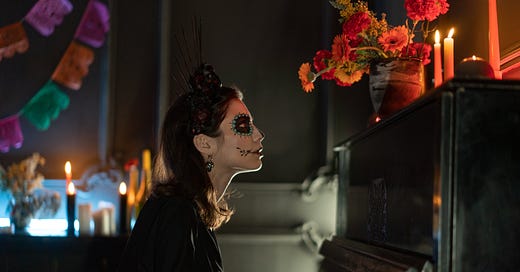Your journal prompts this week:
What do I know about my ancestors, and how do I remember or honor them?
Which aspects of my lineage do I feel most drawn to explore on a deeper level?
What have I—and can I—learn from my ancestors?
What would I like to bring up for healing in my ancestral line, and how might I begin to do this?
Who we are, where we came from, and who we came from are among the biggest personal aspects of ourselves that we explore in our lifetimes.
We all carry on the wisdom, stories, and traditions of our ancestors, sometimes in more subtle ways and sometimes more obvious and prominent ways. Traditions and rituals are often what help us remember this connection and help us reconnect on a deeper level.
In recent years, I've started learning more about Dia de los Muertos, or Day of the Dead, spanning November 1-2 each year. I find it to be a beautiful way of honoring our loved ones and ancestors in spirit, and it is part of my lineage.
My mother is Mexican, but even now, I stop short of calling myself Mexican American. But technically, I am. Being half Mexican, rather than full has always made it feel somehow less genuine for me to call myself Mexican. This and the fact that many of the traditions, including the language, have been completely lost in our family. Our strongest tie to it is the traditional food my mom makes, and even that, some of my Mexican American friends have informed me, is quite dialed down—particularly in the spice factor. This was because my dad didn't like spicy food, so my mom didn't use it as much. (And for context, my ancestry from my dad's side is Swedish with a little English and German, from what I've been told.)
My experience with my own heritage and culture has very much been watered down, all across the board, from my mom's side to my dad's side. But for some reason the lack of connection to my Mexican lineage is what bothers me the most.
Maybe it is because that is my mother's side and I feel a strong connection there, especially now as a mother, and my own mother's relationship with her mother was not a good one. I never met my grandmother, and from what I've been told, she really had no desire to meet me.
It could also be because of the guilt I feel around perhaps not properly acknowledging the Mexican side of myself. This part of myself didn't help me fit in as a kid, in the predominantly white, Christian town of Wheaton, IL—and I needed all the help I could get to fit in there. Though, to be clear, I am white, and therefore did benefit from all the privileges of being white. But sometimes little things would come up that would make people wonder about my origins.
I remember a friend from school seeing me out with my mom at the grocery store. As we were waiting for our moms to go through the checkout line, she whispered to ask me if I was adopted.
There were some other instances I don't remember as well, but my mom does. She says she remembers being asked if she was the nanny.
In sixth grade, I was given an assignment with another girl to come in dressed as a mom for a scene we were acting out from a book. Naturally, we both asked our moms if we could borrow their clothes. The other girl showed up to school in a tweed Chanel suit with a strand of pearls. Meanwhile, I showed up in a very brightly colored, primarily orange, red, and yellow patterned wrap dress. The other girl laughed at me when I came into the classroom and said, "That’s how you dress like a mom?!"
I immediately got embarrassed and said it was indeed my mom's dress, and she wore it all time, so I was in fact dressing like a mom. I'm sure it didn't help that it was much too big on me, but the fact that a brightly-colored wrap dress was considered inauthentic next to her mom's upper-middle class white woman uniform says something. Looking back, I wish now that I had been the one who laughed, as the thought of my mom ever wearing a tweed Chanel suit with pearls is hilarious, and I'm really glad that was never something she wore.
When it came time to select a foreign language to study in eighth grade, rather than learning to speak Spanish (something my mom didn't even fully learn herself, as her parents only ever spoke English to their children), I opted for French. It seemed far more glamorous and unique than Spanish.
Feeling some guilt over this, I decided to take Spanish in college. But most of the time I mixed it up with French, saying Spanish words in a French accent or saying French words in a Spanish one. I got so confused, I gave up after two years.
While all of these little moments in my life didn't have much more of an impact on me than making me feel a little embarrassed or left out, they were enough to encourage me to continue quietly ignoring the Mexican side of myself. I mean, I couldn't even manage to speak the language! And since we didn't get along with much of our extended family on my mom's side, it seemed like it really wasn't that important for me to claim it.
It wasn't until I developed a greater interest in spirituality that a desire to connect with my own heritage and ancestors and their spiritual practices rose up within me. Despite the not-so-pretty things in our family line, I'm still curious about where I came from. I think often of the work that is needed to create what feels like some necessary healing. I find myself asking, what role can I play in this, how can I make it better for future generations? How can I help my daughter understand where she came from and who she came form, even if the relationships were flawed and complicated? And I think, or rather I know, that there's a lot that can't be healed within me unless where I come from is fully acknowledged.
Our ancestry and lineage and ethnic backgrounds are truly so much more than just a box to check on legal and census forms. They are components that make up our greater story, like the background and the setting, and at some point, we all choose whether to keep these in the story or edit them out.
No, they are not ALL of our story and one could argue they may not even be the most important or interesting aspects of it, but they can perhaps explain some of our common perceptions and biases and conditioning. We can't help but internalize the experiences and wisdom of those who came before us, whether we had (or have) regular contact with them in life.
I am very much still in the midst of this exploration, but as the Day of the Dead comes back around this year, I am reminded to continue exploring this, one step at a time. I've been getting quiet and asking my ancestors what I need to know, and I'm letting it grow from there. I am taking the time to acknowledge them so that they know I'm listening, and I'm willing to do the work.
How do you acknowledge those who came before you? How would you like to acknowledge them more? I encourage you to explore with the above journal prompts.
While journaling is a solo practice, I want this to be a place for love and support. So, as always, please feel free to share your insights in the comments below.
With much love and gratitude,
Marcy















Share this post